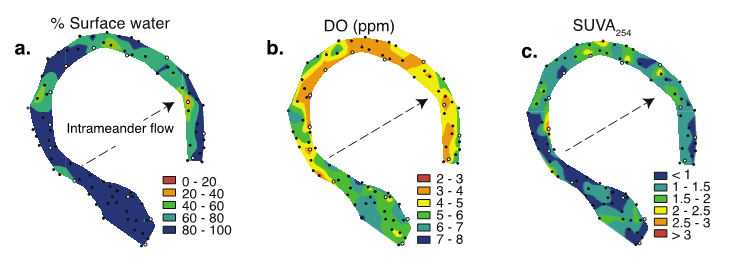November 19, 2019
Spatial Heterogeneity in Streambed Biogeochemistry
East River meander morphology drives hyporheic flow, with implications for streambed chemistry and microbial community composition

Intrameander flow paths result in lateral heterogeneity in streambed surface water-influence (a), dissolved oxygen (b), and specific UV absorbance at 254 nm (SUVA254, c, indicator of organic compound aromaticity). Water flow in channel is clockwise.
[Reprinted with permission from Nelson, A.R., et al. “Heterogeneity in Hyporheic Flow, Pore Water Chemistry, and Microbial Community Composition in an Alpine Streambed.” Journal of Geophysical Research: Biogeosciences 124 (11), 3465-3478 (2019). [DOI:10.1029/ 2019JG005226] © 2022 John Wiley & Sons Ltd.]
The Science
Groundwater and surface water mixing in streambeds (hyporheic exchange) is important for nutrient and carbon cycling and influences the overall quality of surface water. To better understand and map relationships between hyporheic exchange, pore water chemistry, and microbial communities, a research team characterized the streambed of a prominent meander bend of the East River in Colorado during low flow conditions. They found that meander morphology of this alpine streambed caused lateral spatial variability in channel hyporheic flow and drove streambed biogeochemical conditions. Regions of the streambed with greater surface water influence had larger concentrations of dissolved oxygen and microbially available carbon compounds. The composition of streambed microbial communities also shifted with changes in pore water chemistry, though communities were all similarly diverse.
The Impact
The progression of climate change is resulting in earlier snowmelt onset and reduced snowpack in alpine regions, causing a longer baseflow (or low flow) period for alpine streams, which subsequently impacts streambed flow and biogeochemical processes. This study characterized streambed biogeochemistry at high resolution during baseflow to constrain how nutrient cycling in alpine watersheds may shift with climate change.
Summary
Researchers conducted a high-resolution characterization of streambed hydrology and biogeochemistry around a prominent meander bend of the East River near Crested Butte, Colo. The team observed sinuosity-induced heterogeneity in hyporheic flow, pore water chemistry, and microbial community composition. The presence of intrameander flow paths resulted in spatial heterogeneity in the upwelling and downwelling of water, and subsequent surface water influence in the streambed. Surface water downwelled in a large recharge zone on the up-valley side of the meander and discharged on the down-valley side of the meander. Variability in hyporheic flow resulted in similar patterns in pore water chemistry and concentrations of substrate for microbial metabolism. Regions of the streambed with large surface water influence had higher dissolved oxygen concentrations, relatively low metal concentrations, and more labile, fresh dissolved organic matter. In contrast, groundwater-dominated regions had low dissolved oxygen and high metal concentrations, along with more recalcitrant dissolved organic matter. Results indicate that lateral heterogeneity in pore water chemistry drives microbial community composition, although streambed microbial communities are similarly diverse. The team’s findings enhance understanding of hyporheic biogeochemical conditions during baseflow, which is expected to lengthen with climate change.
Principal Investigator
Susan Hubbard
Lawrence Berkeley National Laboratory
sshubbard@lbl.gov
Program Manager
Jennifer Arrigo
U.S. Department of Energy, Biological and Environmental Research (SC-33)
Environmental System Science
jennifer.arrigo@science.doe.gov
Paul Bayer
U.S. Department of Energy, Biological and Environmental Research (SC-33)
Environmental System Science
paul.bayer@science.doe.gov
Funding
This work was supported by the Office of Biological and Environmental Research within the U.S. Department of Energy Office of Science and by the Geological Society of America.
Related Links
References
Nelson, A.R., et al. "Heterogeneity in Hyporheic Flow, Pore Water Chemistry, and Microbial Community Composition in an Alpine Streambed." Journal of Geophysical Research: Biogeosciences 124 (11), 3465–3478 (2019). https://doi.org/10.1029/2019JG005226.

